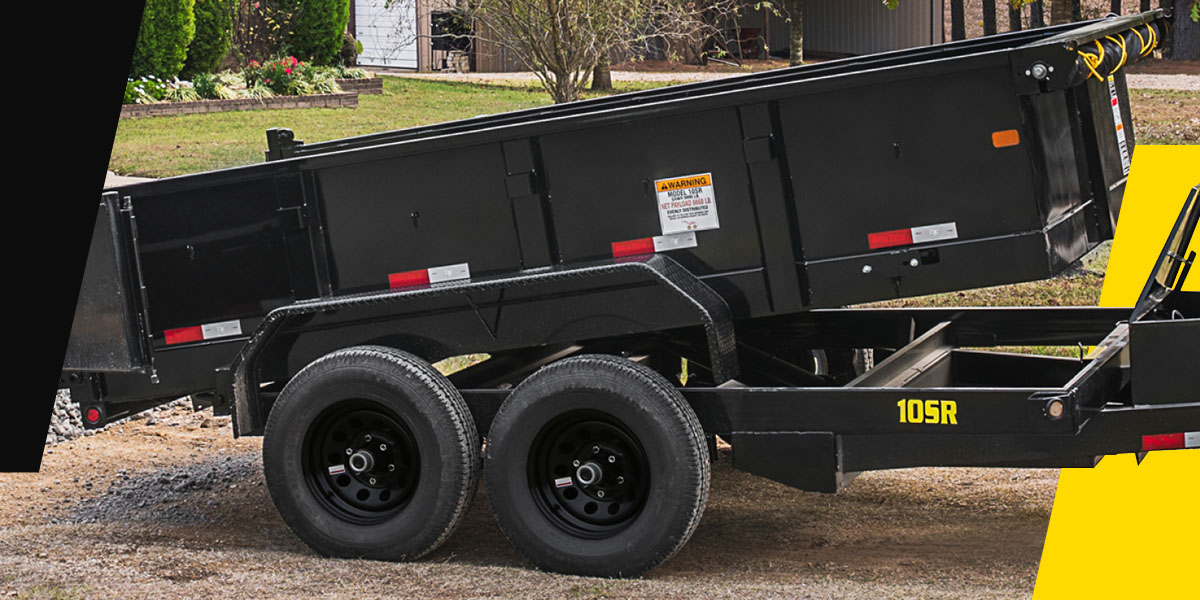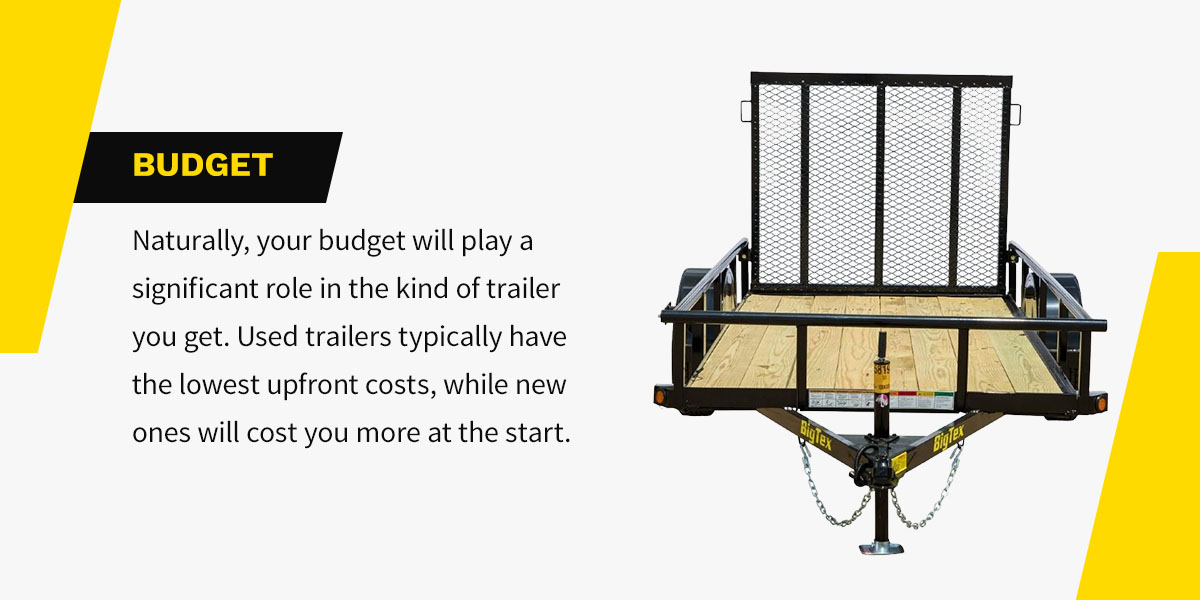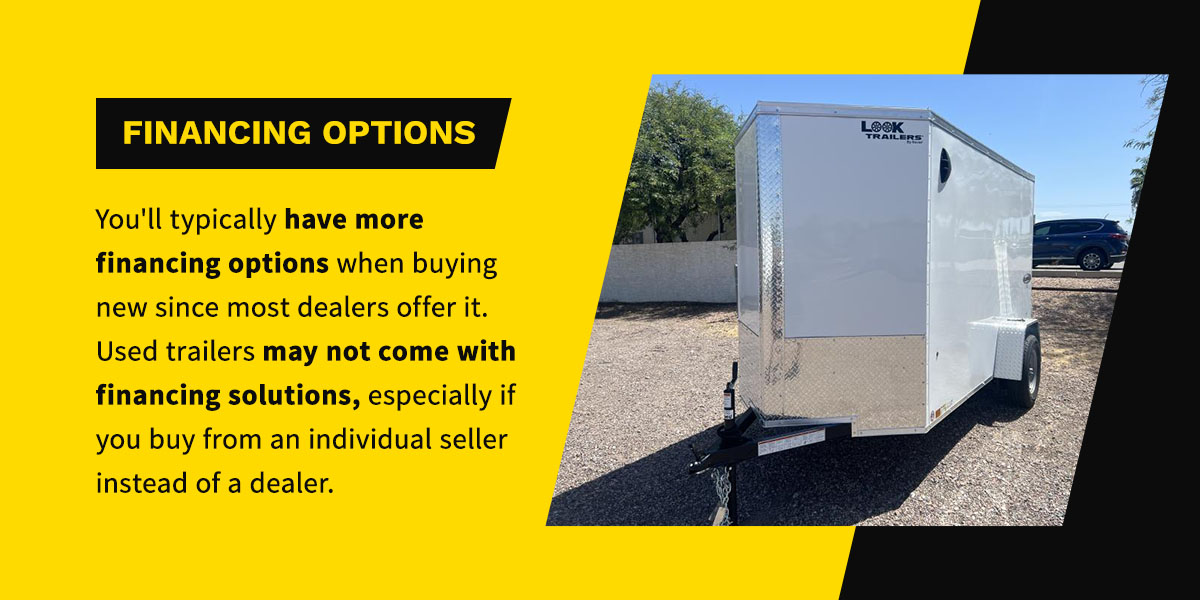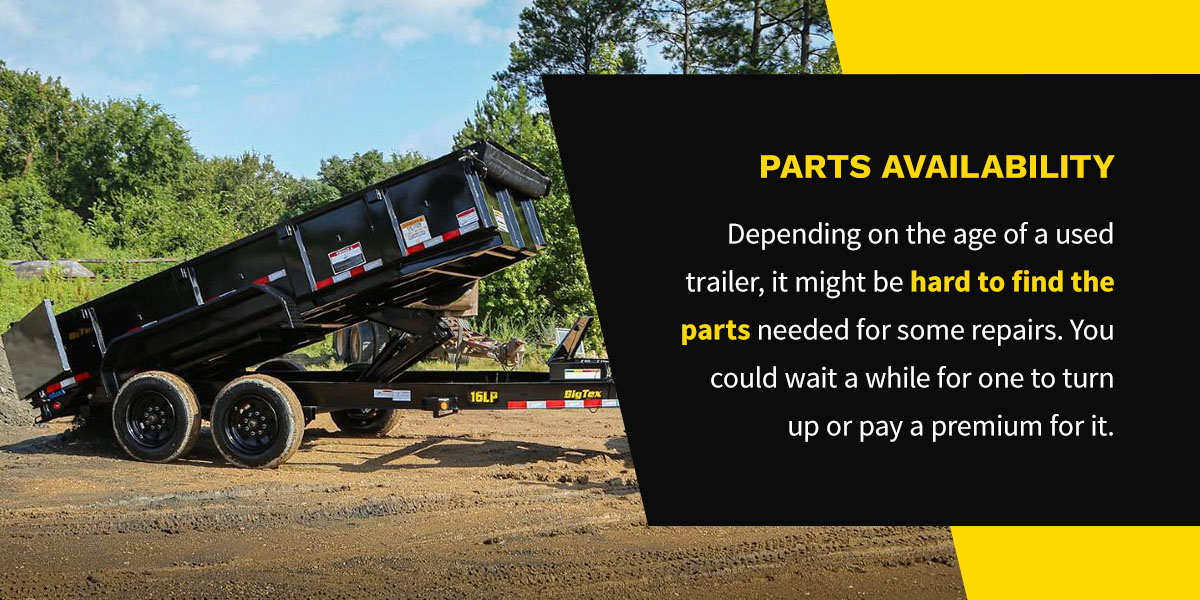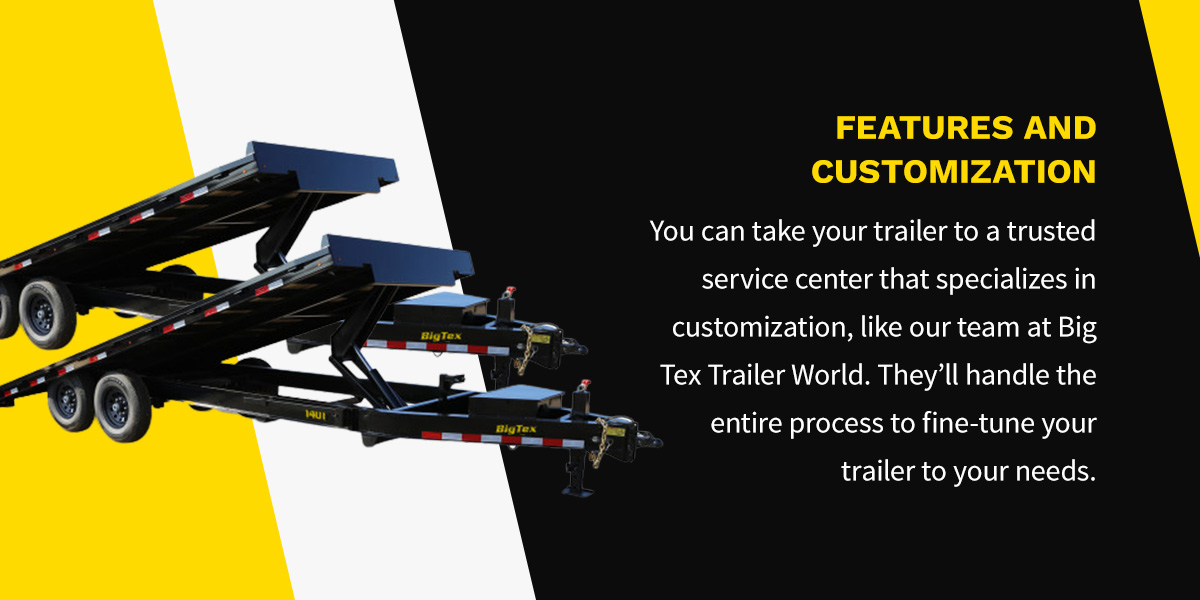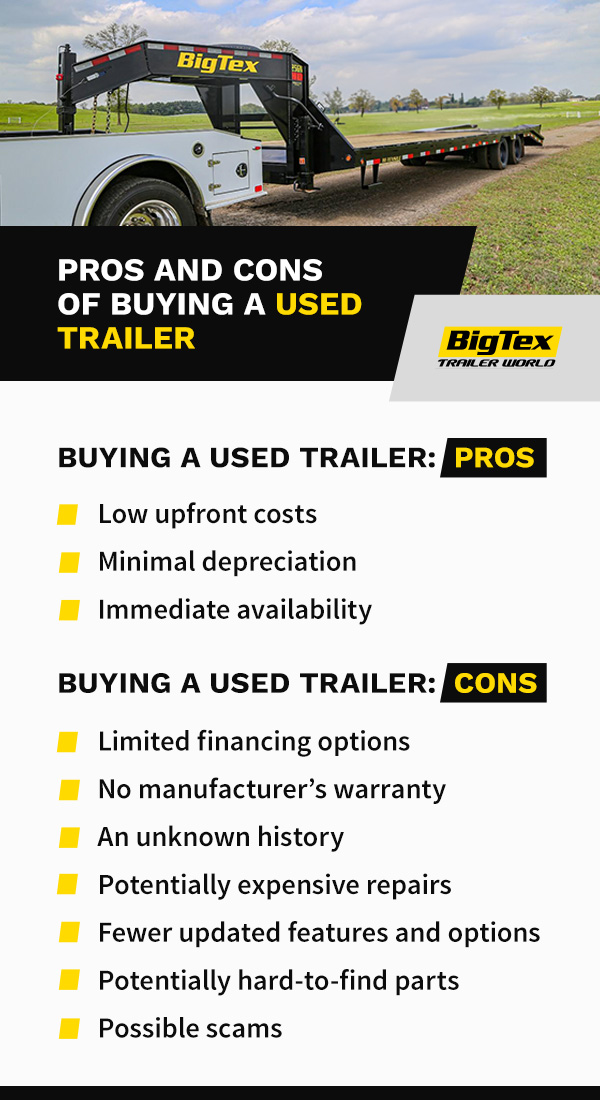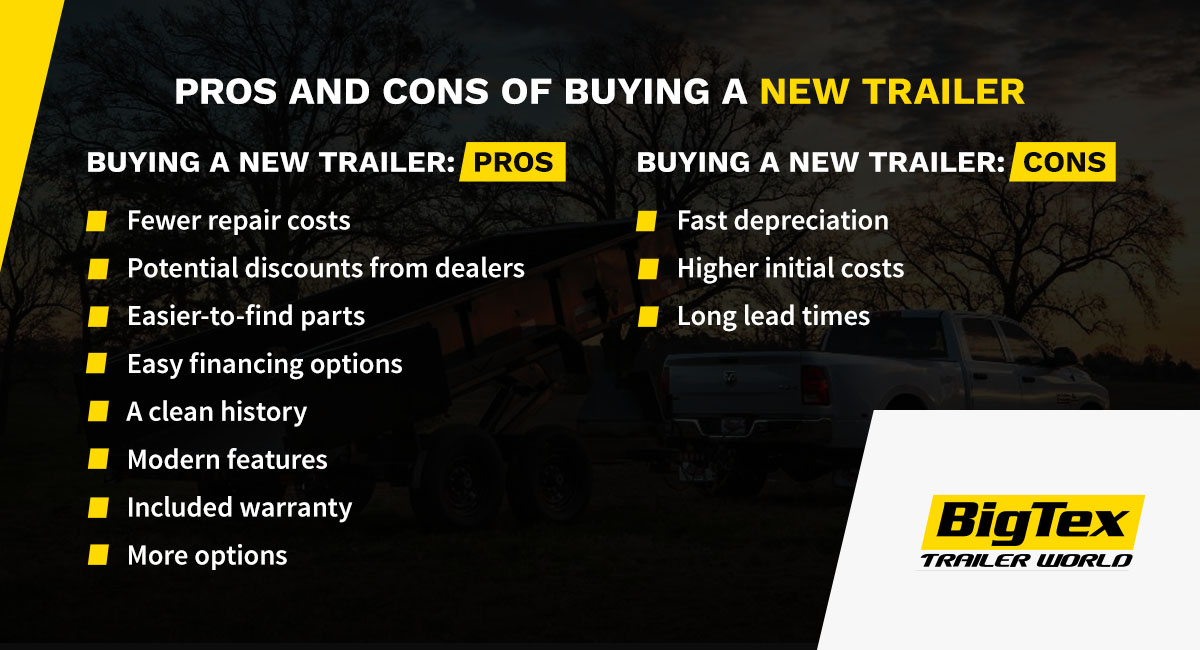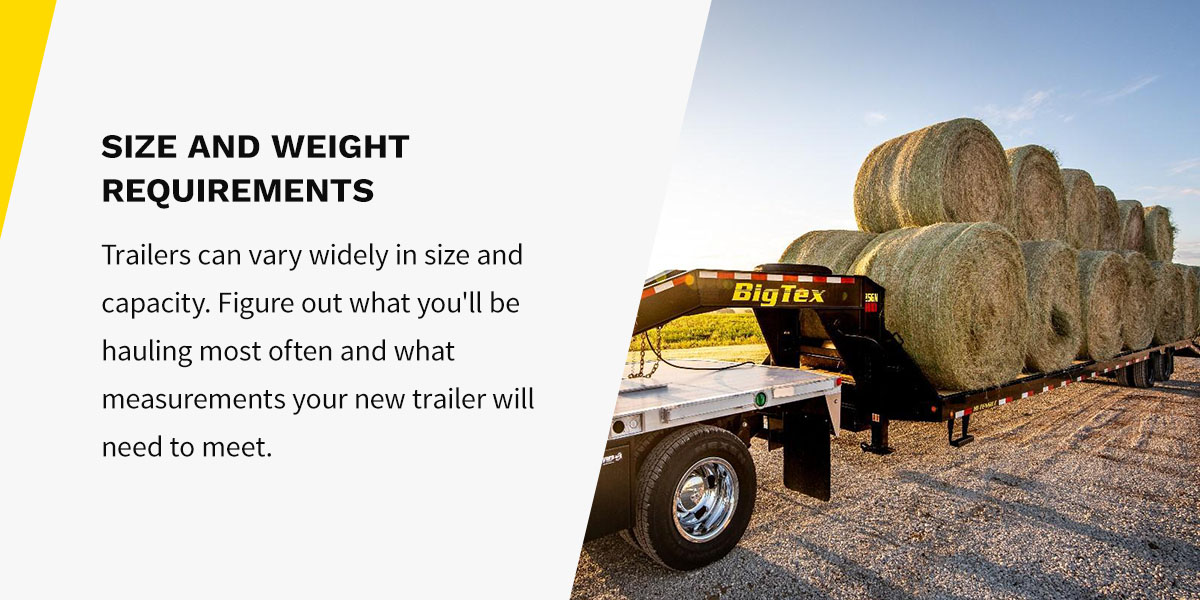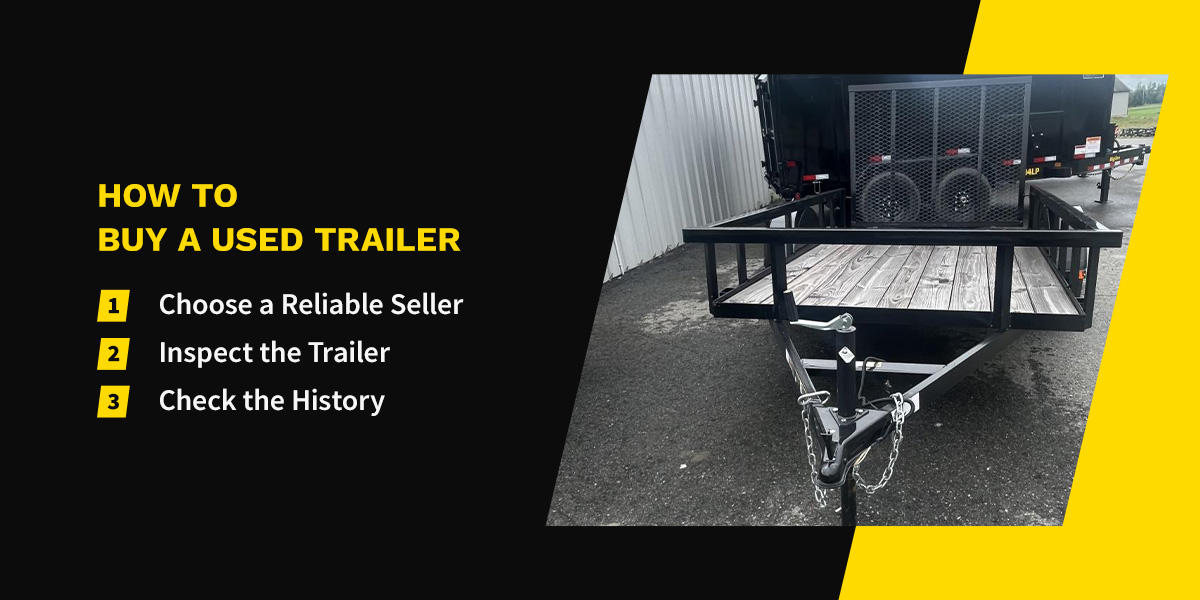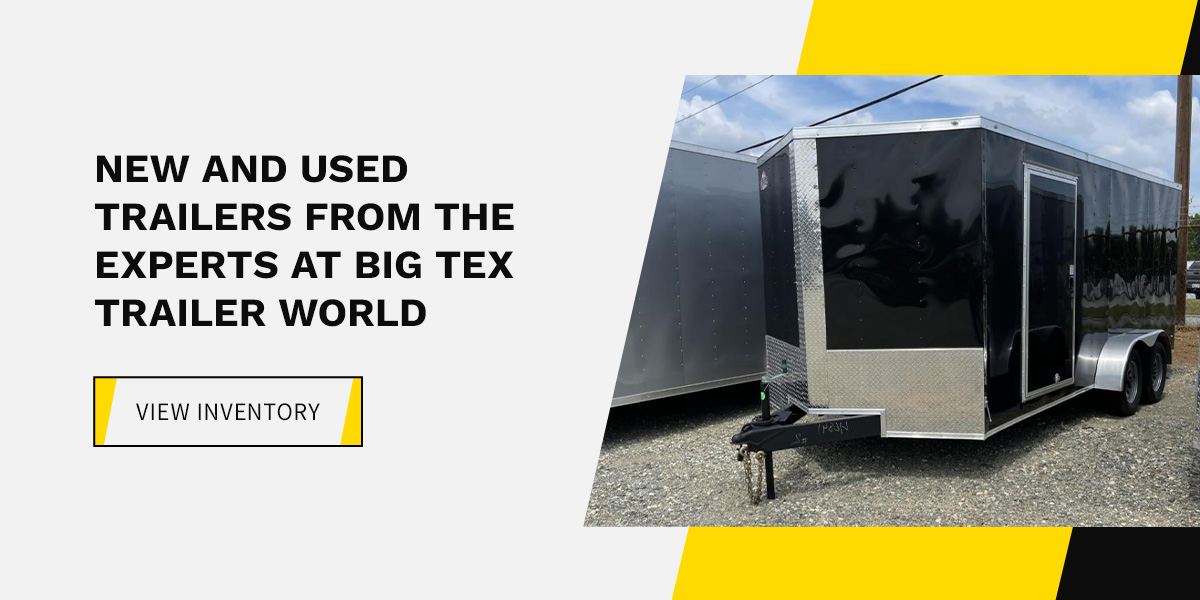Buying a trailer is similar to buying a car — you can explore new and used options to find the right combination of features and a condition that fits your budget. However, you’ll also need to consider other factors before making a purchase, like availability, financing options and the cost of future maintenance.
Whether you’re buying for personal or commercial use, the decision between new and used trailers may not be clear. To help you make an informed decision, we’ve compiled a guide to new vs. used trailers and how to shop for each one.
Should You Buy a New or Used Trailer?
There’s no easy answer to this question. It depends on many factors, like what you want from your trailer and your budget. A business with a seemingly unlimited budget, complex demands and a low tolerance for unexpected repairs might be an excellent fit for a new trailer. An individual who wants something simple to help with yardwork might prefer a used trailer.
The equation isn’t always straightforward, but here are some aspects to consider when deciding whether you should buy a new or used trailer:
Budget
Naturally, your budget will play a significant role in the kind of trailer you get. Used trailers typically have the lowest upfront costs, while new ones will cost you more at the start. You can sometimes find deals and discounts on new trailers that reduce the initial costs, but these savings aren’t as common on used items.
When determining your budget, remember to include extra costs associated with your purchase, like financing fees or down payments and additional warranties. Consider long-term repair and maintenance costs, too. Older trailers typically need more maintenance and may be more likely to need repairs. This upkeep can drive up the price of the trailer in the long run, whereas a new trailer might only need minimal maintenance.
Depreciation and Resale Value
Like cars, trailers depreciate once you drive them off the lot. For example, a popular rule of thumb for cars says that they lose about 20% or more of their value in the first year. Trailers also depreciate, so a new model will be worth less than you paid almost immediately. When you buy an older trailer, it has already experienced the fastest period of depreciation. It loses value at a slower rate, so you can expect to sell it for an amount closer to what you paid for it.
Consider whether depreciation and resale values matter to you. If you plan on using your trailer until you run it into the ground, then you may not care whether it will sell for a lot. But if you want to sell or trade your trailer in a few years, consider the resale value and how much depreciation will impact the total cost of your trailer.
Financing Options
Are you hoping to finance your trailer? You might need to buy new or work with a dealer that offers financing for used trailers. You’ll typically have more financing options when buying new since most dealers offer it. They might offer perks, too, such as lenient qualification requirements or periods of low interest. Used trailers may not come with financing solutions, especially if you buy from an individual seller instead of a dealer. In these situations, you would likely need to arrange financing with a separate party.
For those who need financing, the ease of applying and potential perks can make a new trailer from a dealer more appealing. Then again, if you don’t need financing, this aspect won’t affect your purchase.
Trailer Age and History
With a shiny new trailer, you know you’re the only one to have owned it. You know the exact history of that trailer, which has barely been used since it came off the manufacturing floor. A new trailer might also have more desirable features or components, and it shouldn’t have any problems. A used trailer isn’t as transparent. It might have a murky past and could be missing out on newer features.
Buying a used trailer means considering how well the trailer’s been handled and maintained and the impacts of regular wear and tear. A particularly old model might need a lot of attention and upkeep. Still, many owners treat their trailers well and conduct thorough maintenance and repairs. Used trailers come with some uncertainty, but you can mitigate the unknown with smart shopping practices, like getting an inspection, which we’ll discuss later.
Some components that may warrant a closer inspection include the tires, brakes and axles. Problems with these areas might call for an expensive replacement or repair later on.
Parts Availability
Depending on the age of a used trailer, it might be hard to find the parts needed for some repairs. You could wait a while for one to turn up or pay a premium for it. Since the manufacturers still make many of the parts used in newer models, they’re fairly easy to find, so you likely won’t be without a trailer for very long.
Warranties
If you want a warranty, you’ll likely need to buy new. Most new purchases come with a manufacturer warranty covering defects in the trailer. It won’t cover regular wear and tear or damage, but it offers peace of mind that you won’t pay for problems that occur during the warranty period. Some brands even offer longer warranties on specific components, like axles.
Unfortunately, most trailer warranties won’t transfer to a new owner. You might be able to purchase an extended warranty, but the manufacturer’s warranty is typically not available.
Features and Customization
Got your eye on something specific? You’ll have a lot more options if you buy a new trailer. You can choose from many modern features and components. Used trailers usually don’t offer as big of a selection.
If you want to customize your trailer, the process looks similar for both new and used options. In either case, you can take your trailer to a trusted service center that specializes in customization, like our team at Big Tex Trailer World. They’ll handle the entire process to fine-tune your trailer to your needs.
Trustworthy Sellers
When you buy used, you must be especially careful with who you buy from. A reliable dealer will help you make a safe purchase, but individual sellers could try to scam you. They might hide major problems with the trailer or leave out the fact that they don’t have a title to sign over. Many sellers are perfectly honest, but buying from individuals creates more work for the buyer, who must take steps to confirm the authenticity of the sale.
Do your research and be cautious about these kinds of sales. Most dealers have already inspected the trailer and have the paperwork ready to go, making your experience simple and trustworthy.
Pros and Cons of Buying a Used Trailer
Buying a used trailer can be a solid option for someone with a limited budget. If you’re OK foregoing some of the peace of mind that comes with a new trailer — like a warranty and a clean history — a used trailer can offer significant savings.
Buying a Used Trailer: Advantages
Some of the benefits of buying a used trailer include:
- Low upfront costs: Used trailers are the most affordable option, with lower overall prices. While buying used has some downsides, the lower cost is a significant benefit that helps outweigh them.
- Minimal depreciation: Since a used trailer has already had its first owner, it won’t see the sharp drop in value that new trailers do.
- Immediate availability: Buying a new trailer from a manufacturer can mean waiting a long time to get your trailer, but used models are available right away.
Buying a Used Trailer: Disadvantages
If you want to take advantage of these benefits, you’ll need to consider the drawbacks of buying used, such as:
- Limited financing options: Not all dealers offer financing on used products. You might want to find one that offers financing options or works with a third-party financing company.
- No manufacturer’s warranty: With a used trailer, you likely won’t have a warranty period if something goes wrong.
- An unknown history: You don’t always know the history of a used trailer, so you may need a professional inspection to ensure it is in good condition.
- Potentially expensive repairs: A used trailer is usually older and more likely to experience problems that require repairs.
- Fewer updated features and options: Since you’re shopping for older models, you may not be able to find some newer features or options that newer trailers have.
- Potentially hard-to-find parts: Manufacturers may not make the parts for old trailers anymore, making repairs harder or more expensive.
- Possible scams: Lastly, buying a used trailer requires a trustworthy seller, so you must be on alert for scams.
Pros and Cons of Buying a New Trailer
If you aren’t worried about a low price or want a trailer that’s as reliable as possible, a new purchase might be for you. You’ll pay a little more, but you get considerable peace of mind and a trailer that should last for a long time.
Buying a New Trailer: Advantages
Some of the advantages of buying a new trailer include:
- Fewer repair costs: While a new trailer still needs regular maintenance, a brand-new product likely won’t require as many repairs as a used one.
- Potential discounts from dealers: You might be able to snag a discount on a new trailer from the dealer.
- Easier-to-find parts: Recent models use parts that are probably still being produced, so you should be able to get them easily if necessary.
- Easy financing options: Most dealers offer financing solutions for new trailers.
- A clean history: Your new trailer won’t have any prior problems or wear and tear.
- Modern features: A new trailer might offer modern features you can’t find in older models.
- Included warranty: The manufacturer’s warranty can help protect you from defects in the product for the first few years.
- More options: You might have more options to choose from in a new trailer.
Buying a New Trailer: Disadvantages
Of course, no solution is perfect. The disadvantages of buying a new trailer can include:
- Fast depreciation: A new trailer will lose a good portion of its value right away.
- Higher initial costs: Of course, a new trailer will typically cost more than a used one, but many people find that the benefits outweigh the costs.
- Long lead times: If you buy directly from the manufacturer, you may face long lead times on a new, customized trailer. A dealer can help you get your trailer faster.
New and Used Trailer Buying Guide
Whether you opt for a new or used trailer, you’ll need to select one that fits your needs and application. Before heading to the dealership, consider the following aspects to help narrow down your search.
Type of Trailer
You probably already have an idea of what kind of trailer you need, but if not, find one that fits your application. You can choose from styles like:
- Dump trailers: A dump trailer works like a dump truck, tipping out its contents with a hydraulic lift. These trailers are great for moving large volumes of material, like dirt piles or landscaping scraps.
- Gooseneck trailers: Gooseneck trailers fit onto the back of a pickup truck, allowing them to leverage heavier loads while staying maneuverable.
- Utility trailers: These simple trailers are popular, versatile and highly maneuverable. If you need to haul equipment, transport items for a move and carry debris, a utility trailer is a fantastic pick.
- Cargo and enclosed trailers: Enclosed and cargo trailers offer better containment for large items, keeping them secure during the drive.
- Equipment and auto trailers: These specialized trailers can secure heavy equipment and cars. They typically have features for driving or pulling cars and equipment onto the trailer.
- Tilt trailers: As the name implies, a tilt trailer tips downward to help with loading. It eliminates the need for a separate ramp and can be a good pick for heavy items, vehicles and other difficult loads.
- Livestock trailers: A livestock trailer is designed to hold cattle and horses and can be open-air or enclosed. You can find smaller ones for just a couple of animals or large trailers.
Not sure which kind you need? Consider renting a trailer to test one and see if it’s right for your application.
Size and Weight Requirements
Trailers can vary widely in size and capacity. Figure out what you’ll be hauling most often and what measurements your new trailer will need to meet. If you want to carry a recreational vehicle, for instance, take its measurements and make sure it fits the dimensions of the floor of the trailer you’re considering.
Identifying the maximum weight you can tow is a little more involved and depends on your vehicle. Start with your vehicle’s gross combined vehicle weight rating (GCVWR), which you can usually find in your owner’s manual or on the label on the driver’s side door. Subtract your vehicle’s curb weight — how heavy it is when empty — from the GCVWR. Subtract passenger weights and any loads, such as items carried in a truck bed. The resulting number is your towing capacity.
Say you have a truck with a GCVWR of 12,000, and your truck weighs 4,000 pounds when empty. If you have a 1,000-pound load in the truck bed, you can tow about 7,000 pounds of weight. This number includes the weight of the trailer itself and the load.
As you shop for a trailer, keep this weight limit in mind and look for trailers rated for the weight of your anticipated payloads.
Type of Hitch
Check which kind of hitch the trailer supports and whether you might need a coupler to connect it to your vehicle. The best hitch will depend on which type of trailer you have and the size of your vehicle. Common hitch styles include receiver hitches, fifth-wheel hitches and gooseneck hitches. Some are divided up into classes based on the weight of the trailer. If you’re not sure what you need, talk to your dealer for more information.
How to Buy a Used Trailer
As you’ve probably gathered, buying a used trailer isn’t as simple as buying a new one. You can save significantly by buying used, but you’ll need to be a smart shopper and take the right precautions to avoid buying a trailer that will just increase costs for you in the future. If you decide to buy a used trailer, walk through the following steps first.
1. Choose a Reliable Seller
One of the most important parts of buying used is buying from a trustworthy seller. It might be tempting to jump on a good deal posted on social media, but a private seller doesn’t offer the same protections as a dealer. To ensure the seller fully owns the trailer, you’ll need to get a bill of sale and a clear title with the seller listed as the owner.
Private sellers could also be dishonest about the condition and history of the vehicle, which is why we suggest the inspection and VIN check we’ll discuss next. Ideally, it would be best to buy a used trailer through a dealer. They’ll take care of all of these tasks and provide recourse if something were to go wrong with the purchase. Dealers might also replace or repair components in poor condition.
2. Inspect the Trailer
Consider getting an inspection on a used trailer. An inspection performed by a trusted trailer expert can give you a second opinion and peace of mind. The inspector can confirm that everything is in working condition. Again, dealers will typically conduct their own inspections before putting used trailers on the lot.
During an inspection, look for the following:
- Matched tires free of cracks or holes that support the trailer’s capacity
- Brakes, pads, shoes, rotors, magnets and drums in good condition
- A suspension and frame free of cracks or prior repairs
- Lubricated and properly seated bearings
- A functioning electrical system
- A straight, crack-free ramp with a properly functioning attachment
- Flooring that’s free of damage and holes
3. Check the History
While doing your due diligence, check on the trailer’s history. Confirm that the VIN is stamped on the trailer and matches all paperwork. Ask about the service history and any modifications. If there are customizations to the trailer, verify they’ve been correctly installed. Your dealer should have all of this information.
New and Used Trailers From the Experts at Big Tex Trailer World
Whether you want a trailer for small or large jobs or something in between, new and used options allow you to choose the ideal trailer. Here at BigTex Trailer World, our large selection of new and used trailers makes it easy to find the right model.
Choose from utility trailers, gooseneck trailers, dump trailers and much more. You can benefit from our financing options, and our service department is there to make your experience as smooth as possible — from customizations and rentals to free inspections.
Explore our inventory today, or find a location near you to learn more!
